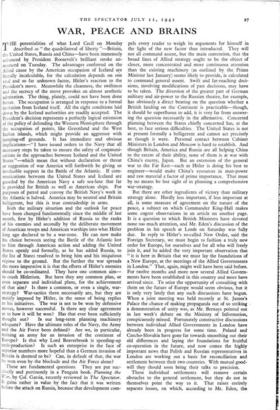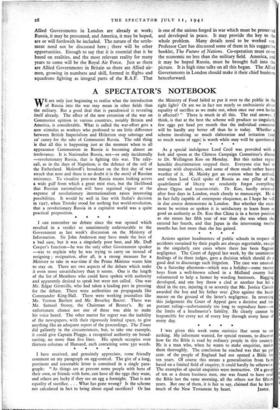WAR, PEACE AND BRAINS
THE potentialities of what Lord Cecil on Monday described as "the quadrilateral of liberty "—Britain, the United States, Russia and China—have been immensely enhanced by President Roosevelt's brilliant stroke an- nounced on Tuesday. The advantages conferred on the Allied cause by the American occupation of Iceland are literally incalculable, for the calculation depends on one vital and so far unknown factor, Hitler's reaction to the President's move. Meanwhile the cleanness, the swiftness and the secrecy of the move provokes an almost aesthetic admiration. The thing, plainly, could not have been done better. The occupation is arranged in response to a formal invitation from Iceland itself. All the eight conditions laid down by the Iceland authorities are readily accepted. The President's decision represents a perfectly logical extension of the policy of defending the Western Hemisphere through the occupation of points, like Greenland and the West Indian islands, which might provide an aggressor with jumping-off grounds. It has immediate and obvious implications—" I have issued orders to the Navy that all necessary steps be taken to ensure the safety of coniimuni- cations in the approaches between Iceland and the United States "—which mean that without declaration or threat or suggestion of war America will forthwith be giving us invaluable support in the Battle of the Atlantic. If com- munications between the United States and Iceland are guarded by the American Navy a safe sea-lane that far is provided for British as well as American ships. For purposes of patrol and convoy the British Navy's work in the Atlantic is halved. America may be neutral and Britain belligerent, but this is true comradeship in arms.
Both the military situation and the outlook for peace have been changed fundamentally since the middle of last month, first by Hitler's addition of Russia to the ranks of his enemies and secondly by the deliberate movement of American troops and American warships into what Hitler long ago declared to be a war-zone. He can now make his choice between seeing the Battle of the Atlantic lost to him through American action and adding the United States openly and formally, as he has added Russia, to the list of States resolved to bring him and his iniquitous ragime to the ground. But the further the war spreads the more imperative it is that the efforts of Hitler's enemies should be co-ordinated. They have one common aim— to crush Hitlerism. But have they any common plan, or even separate and individual plans, for the achievement of that aim? Is there a common, or even a single, war- strategy? War-tactics there necessarily are, but they are mainly imposed by Hitler, in the sense of being replies to his initiatives. The war is not to be won by defensive moves, however successful. Is there any clear agreement as to how it will be won? Has that ever been sufficiently
thought out? Is our long-term planning machinery adequate? Have the ultimate roles of the Navy, the Army and the Air Force been defined? Are we, in particular, training an army for an invasion of the continent of Europe? Is that why Lord Beaverbrook is speeding-up tank-production? Is such an enterprise in the face of superior numbers more hopeful than a German invasion of Britain is deemed to be? Can, in default of that, the war be won even by the blockade and the Air Force alone?
These are fundamental quegions. They are put suc- cinctly and pertinently in a Penguin book, Planning the War, by Col. Garsia, recently reviewed in The Spectator. It gains rather in value by the fact that it was written before the attack on Russia, because that development corn-
pels every reader to weigh its arguments for himself in the light of the new factor thus introduced. They will not all command assent, but the main contention, that the broad lines of Allied strategy ought to be the object of closer, more concentrated and more continuous attention than the existing machinery (as outlined by the Prime Minister last January) seems likely to provide, is calculated to command general assent. Swift and far-reaching deci- sions, involving modifications of past decisions, may have to be taken. The diversion of the greater part of German military and air-power to the Russian theatre, for example, has obviously a direct bearing on the question whether a British landing on the Continent is practicable—though, it should be superfluous to add, it is very far from answer- ing the question necessarily in the affirmative. Concerted planning between the States chiefly concerned has, at the best, to face serious difficulties. The United States is not at present formally a belligerent and cannot act precisely as though it were. Personal contact between Cabinet Ministers in Londonand Moscow is hard to establish. And though Britain, America and Russia are all helping China to the extent of their ability, none of them is at war with China's enemy, Japan. But an extension of the general war to the Far East—such as Hitler is doing his best to engineer—would make China's resources in man-power and raw material a factor of prime importance. That must by no means be lost sight of in planning a comprehensive war-strategy.
But there are other ingredients of victory than military strategy alone. Hardly less important, if less important at all, is some measure of agreement on the nature of the peace, a subject on which Commander King-Hall makes some cogent observations in an article on another page. It is a question to which British Ministers have devoted none too much attention, and Mr. Eden's discussion of the problem in his speech at Leeds on Saturday was fully due. In reply to Hitler's so-called New Order, said the Foreign Secretary, we must begin to fashion a truly new order for Europe, for ourselves and for all who will freely join it, and he added the very important observation that "it is here in Britain that we must lay the foundations of a New Europe, at the meetings of the Allied Governments in London." That, again, might well have been said before. For twelve months and more now several Allied Govern- ments have been established in this country and more have arrived since. To seize the opportunity of consulting with them on the future of Europe would seem obvious, but it is only very lately that any such discussions have begun. When a joint meeting was held recently at St. James's Palace the chance of making propaganda out of so striking • a demonstration of unity was, as Mr. Bemays pointed out in last week's debate on the Ministry of Information, conspicuously missed. Fortunately constructive discussions between individual Allied Governments in London have already been in progress for some time. Poland and Czecho-Slovakia have gone far towards smoothing out their old differences and laying the foundations for fruitful co-operation in the future, and now comes the highly important news that Polish and Russian representatives in London are working out a basis for reconciliation and settlement between their two countries. With mutual good- will they should soon bring their talks to precision.
These individual settlements will remove certain obstacles to the general settlement, but they do not in themselves point the way to it. That raises entirely separate issues, on which, according to Mr. Eden, the Allied Governments in London are already at work; Russia, it may be presumed, and America, it may be hoped, are or will forthwith be included. The nature of the settle- ment need not be discussed here ; there will be other opportunities. Enough to say that it is essential that it be based on realities, and the most relevant reality for many years to come will be the Royal Air Force. Just as there are Allied Governments in Britain so there are Allied air- men, growing in numbers and skill, formed in flights and squadrons fighting as integral parts of the R.A.F. That is one of the unions forged in war which must be preserved and developed in peace. It may provide the key to the whole problem. Many details need to be worked out Professor Carr has discussed some of them in his suggestive booklet, The Future of Nations. Co-operation must cover the economic no less than the military field. America, and it may be hoped Russia, must be brought full into the picture. It is high time talks on all this began. The Allied Governments in London should make it their chief business henceforward.



























 Previous page
Previous page